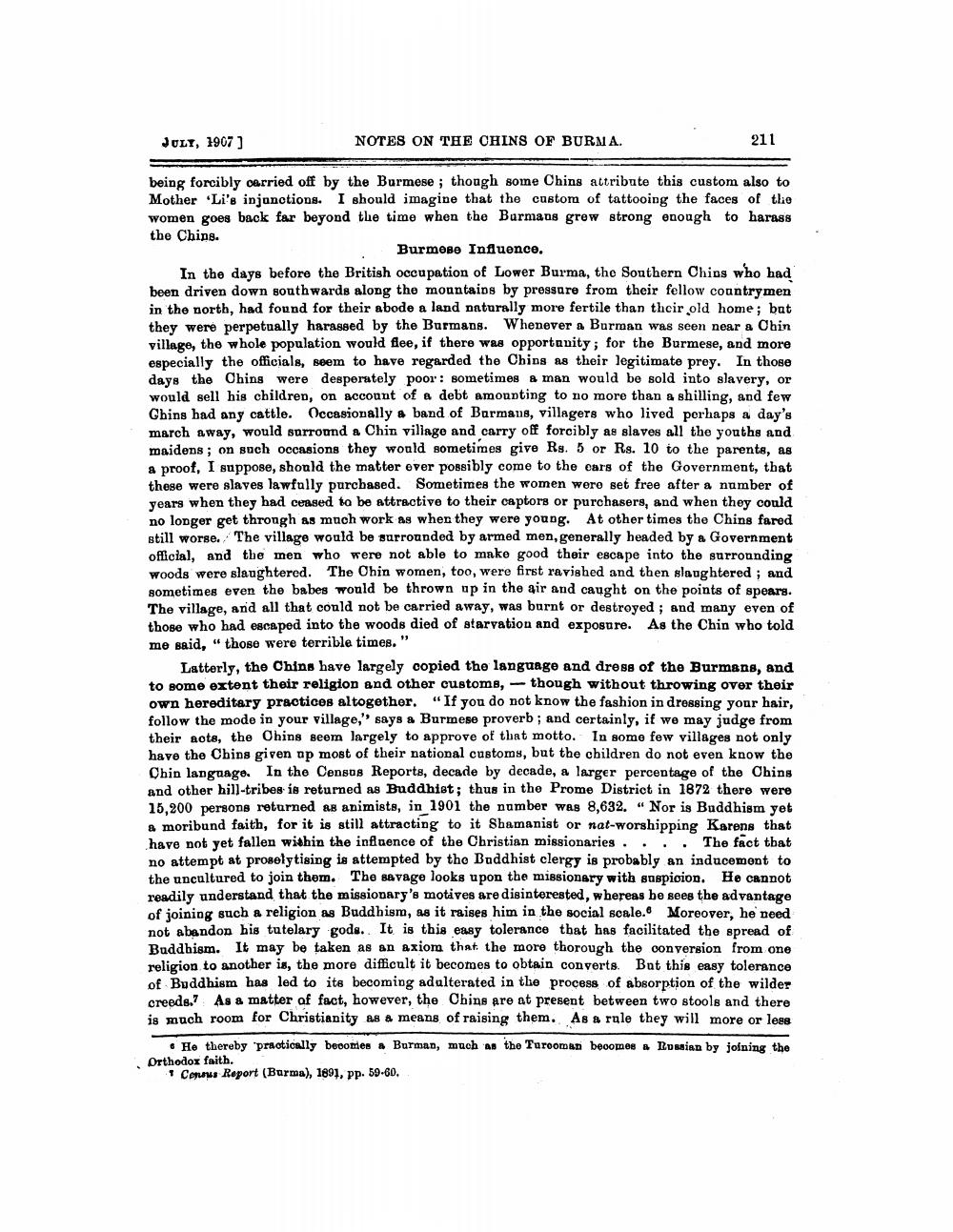________________
JOLT, 1907)
NOTES ON THE CHINS OF BURMA.
211
being forcibly carried off by the Burmese ; though some Chins attribute this custom also to Mother Li's injunctions. I should imagine that the custom of tattooing the faces of the women goes back far beyond the time when the Burmaus grew strong enough to harass the Chips.
Burmose Influence. In the days before the British occupation of Lower Burma, the Southern Chips who had been driven down southwards along the mountains by pressure from their fellow countrymen in the north, had found for their abode a land naturally more fertile than their old home; bat they were perpetually harassed by the Burmans. Whenever a Burman was seen near a Chin village, the whole population would flee, if there was opportunity; for the Burmese, and more especially the officials, seem to have regarded the Ching as their legitimate prey. In those days the Ohins were desperately poor: sometimes a man would be sold into slavery, or would sell his children, on account of a debt amounting to no more than a shilling, and few Chins bad any cattle. Occasionally a band of Barmans, villagers who lived perhaps a day's march away, would surromd a Chin village and carry off forcibly as slaves all the youths and maidens; on such occasions they would sometimes give Rs. 5 or Rs. 10 to the parents, as a proof, I suppose, should the matter ever possibly come to the ears of the Government, that these were slaves lawfully purchased. Sometimes the women were set free after a number of years when they had ceased to be attractive to their captors or purchasers, and when they could no longer get throngh as much work as when they were young. At other times the Chins fared still worse. The village would be surrounded by armed men, generally headed by a Government official, and the men who were not able to make good their escape into the surrounding woods were slaughtered. The Ohin women, too, were first ravished and then slaughtered ; and sometimes even the babes would be thrown up in the air and caught on the points of spears. The village, and all that conld not be carried away, was burnt or destroyed; and many even of those who had escaped into the woods died of starvation and exposure. As the Chin who told me said, "those were terrible times."
Latterly, the Chins have largely copied the language and dress of the Burmans, and to some extent their religion and other customs, - though without throwing over their own hereditary practices altogether. "If you do not know the fashion in dressing your hair, follow the mode in your village," says a Burmese proverb; and certainly, if we may judge from their aots, the Ohins seem largely to approve of that motto. In some few villages not only have the Chins given op most of their national customs, but the children do not even know the Chin language. In the Censos Reports, decade by decade, a larger percentage of the Chins and other hill-tribes is retumed as Buddhist; thus in the Prome District in 1872 there were 15,200 persons returned as animists, in 1901 the number was 8,632. "Nor is Buddhism yet & moribund faith, for it is still attracting to it Shamanist or nat-worshipping Karens that have not yet fallen within the influence of the Christian missionaries . . The fact that no attempt at proselytising is attempted by the Buddhist clergy is probably an inducement to the uncultured to join them. The savage looks upon the missionary with suspicion. He cannot readily understand that the missionary's motives are disinterested, whereas be sees the advantage of joining such a religion as Buddhism, as it raises him in the social scale. Moreover, he need not abandon his tutelary gods. It is this easy tolerance that has facilitated the spread of Buddhism. It may be taken as an axiom that, the more thorough the conversion from one religion to another is, the more difficult it becomes to obtain converts. But this easy tolerance of Buddhism has led to its becoming adulterated in the process of absorption of the wilder creeds.? As a matter of fact, however, the Chins are at present between two stools and there is much room for Christianity as a means of raising them. As a rule they will more or less
He thereby practically becomes a Burman, much as the Tarooman becomes a Russian by joining the Orthodox faith.
+ Comus Report (Burma), 1891, pp. 59-60.




